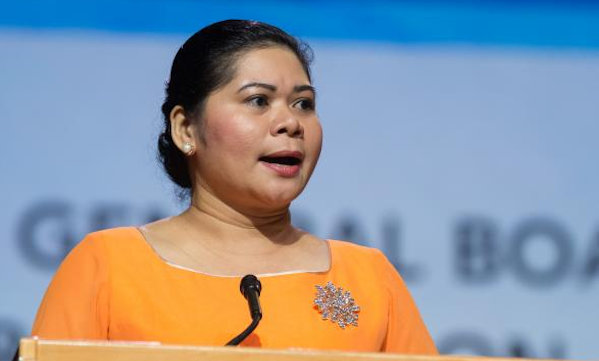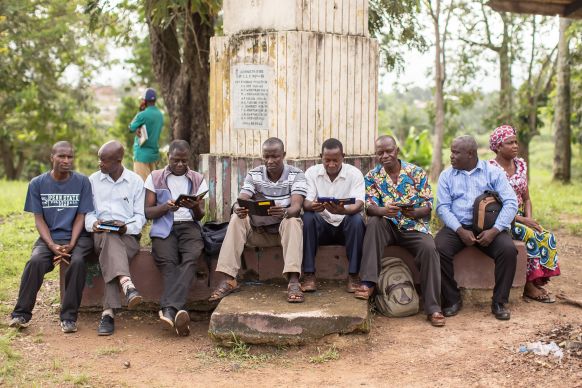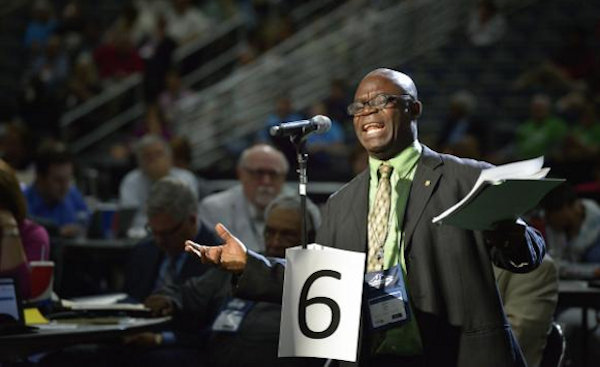The 2016 General Conference doubled the amount The UMC commits to overseas theological education.
SAM HODGES
United Methodist News Service
The Rev. Connie Semy Mella can tick off ways she sees the Central Conference Theological Education Fund making a difference for The United Methodist Church in the Philippines.
Scholarships. Computer labs. E-readers. Radio ministries.
At Union Theological Seminary, a grant from the fund helped create an online academic program for those who don’t have the time or transportation or financial resources to attend in a classroom.
“Through this program, theological education became accessible, portable and affordable,” said Mella, a United Methodist elder and associate dean for academic affairs at Union, in Cavite, Philippines.
Testimonies by Mella and others helped persuade General Conference 2016 to double the amount for the Central Conference Theological Education Fund for the next four years, from $5 million to $10 million.
It’s the one big spending hike in an otherwise essentially flat general church budget.
While the available grant money will likely be somewhat less than $10 million (the money comes from the World Service Apportionment Fund, and the General Council on Finance and Administration estimates payout at 85 percent), partisans of the Central Conference Theological Education Fund are rejoicing.
“We praise and thank God for this blessing of abundance,” said Liberia Area Bishop John Innis.
Keeping the lights on
The fund was created by the General Conference 2012 to further theological education in the central conferences – the non-U.S. parts of The United Methodist Church.
Finding and educating pastors to help the church keep growing in Africa, and begin to grow elsewhere, is a challenge. That’s particularly true in developing countries, where theological schools struggle to have electricity, much less adequate libraries or computer labs.
“The need for support is very evident,” said Central and Southern Europe Area Bishop Patrick Streiff.
General Conference 2012 created a Commission on Central Conference Theological Education, with members appointed by the Council of Bishops, to oversee the fund. Administrative help comes from the United Methodist Board of Higher Education and Ministry.

Commission members, who include Streiff, Innis and Mella, met three times during the last quadrennium to review applications and award grants. A final meeting to distribute funds allotted for 2013-2016 is to be held in Dallas in December.
Grants have been spread among the central conferences, and for a range of projects.
In 2015, an East Congo program to improve training for lay preachers got $27,000. A youth ministries program in Germany received $25,000, and a program to extend the Course of Study program for local pastors in Bulgaria got $3,500.
A $50,000 solar electrification grant for Banyam Theological School in rural Nigeria allowed the campus to have a reliable power source. The better-lit campus resulted in more educational hours, and even helped keep snakes away at night.
Making the case
Each time the commission met, the number of applications far exceeded the grants that could be awarded. Still, the commission asked General Conference 2016 for status quo funding.
“The commission did not ask for an increase because of financial constraints on decreasing budgets for general apportionments,” said Streiff.
But delegates from Africa, notably the Rev. Jerry Kulah, dean of Gbarnga School of Theology in Liberia, came to the legislative session saying the fund should be doubled.
They received support from Good News, an unofficial evangelical caucus in the denomination. Various annual conferences in the United States have ongoing mission work in the central conferences, and they too proved allies.
The arguments for boosting the fund were mainly about the obvious needs across the central conferences. But the fairness argument also came into play, with some delegates noting that Africa University, the United Methodist school in Zimbabwe, has received millions in support, while other denominational schools scrape by.

Once it became clear that the overall general church budget would not see major cuts, or have millions set aside for church growth strategies, delegates easily approved increasing the fund to $10 million.
“I took that as a strong indication of the collective understanding that this is a priority for the church,” said the Rev. Myron Wingfield, an executive with Higher Education and Ministry’s ordained ministry division.
With less fanfare, delegates approved a petition saying that General Administration Fund apportionments paid by the central conferences would — once expenses are covered for the Standing Committee on Central Conference Matters — go to the Central Conference Theological Education Fund.
“Thus, central conferences can themselves contribute in raising support for the theological education,” Streiff said.
Innis has led the commission overseeing the fund, but he’s retiring. Wingfield said the current commission will make the grant decisions in December, but a new commission will be chosen by the Council of Bishops, following geographical and other representation requirements laid out in the Book of Discipline.
Otherwise, the commission will operate more or less the same – only with more money.
Wingfield noted that it’s early in the program’s history, and going forward pressure will increase to show measurable results.
“You have to be able to account to the people in the pews who are providing the resources for this to happen,” he said.
Endowing the future
Meanwhile, Streiff continues to push an endowment created by the Council of Bishops that will draw on donations to provide permanent financial support for central conference theological education.
The endowment is in what Streiff calls the fund-raising “pre-phrase,” but he notes that pledges have come from all regions of the church. He hopes to raise $25 million.
Still, the immediate future rests with the Central Conference Theological Education Fund.
Bishops have no voice or vote at General Conference, but Boston Episcopal Area Bishop Sudarshana Devadhar doesn’t mind weighing in on the decision to add $5 million.
He too has served on the commission overseeing the fund, and joined in rejecting requests he considered worthy.
More will get the green light now.
“This is the right thing, what General Conference did,” Devadhar said.
Last Updated on December 15, 2023

